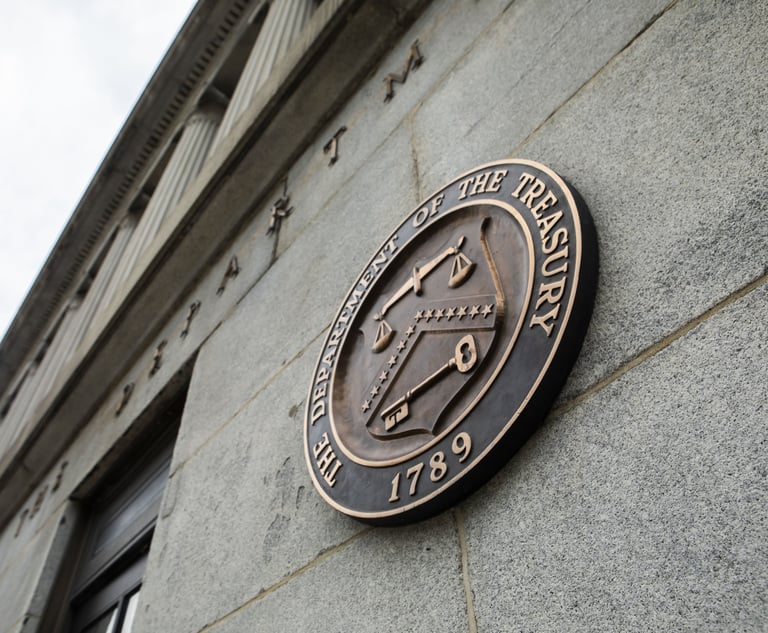 Supreme Court nominee Ketanji Brown Jackson testifies before the Senate Judiciary Committee during her confirmation hearing to be an associate justice of the U.S. Supreme Court, on March 21, 2022. Photo: Diego M. Radzinschi/ALM
Supreme Court nominee Ketanji Brown Jackson testifies before the Senate Judiciary Committee during her confirmation hearing to be an associate justice of the U.S. Supreme Court, on March 21, 2022. Photo: Diego M. Radzinschi/ALM 5 Ways Republicans Will Take On SCOTUS Nominee Jackson
Ketanji Brown Jackson, the 51-year-old federal appeals court judge, has some advantages: nine years on the bench, a Harvard pedigree, and a Democratic Senate majority with the power to confirm her on their own.
March 22, 2022 at 01:44 PM
6 minute read
Ketanji Brown Jackson's toughest questioning during Senate hearings this week will be from Republicans seeking to score political points by implying the Supreme Court nominee is soft on crime while pledging to avoid a repeat of past contentious hearings.
Heading into two days of questioning before the Senate Judiciary Committee, the 51-year-old federal appeals court judge has advantages: nine years on the bench, a Harvard pedigree, and a Democratic Senate majority with the power to confirm her on their own. President Joe Biden wants to see some GOP support for his first Supreme Court pick, and the few Republican votes she might win hinge on how she handles the queries.
On Monday's opening day, Ranking Republican Chuck Grassley vowed that GOP questioning will be respectful even though he and most of the other 10 GOP panel members are hinting they'll oppose her. Senator Lindsey Graham of South Carolina may join them, despite backing every Supreme Court nominee since he came to office in 2003. On the panel are three prospective 2024 GOP presidential candidates — Ted Cruz of Texas, Tom Cotton of Arkansas and Josh Hawley of Missouri — and each will be looking to use the hearings to polish their appeals to the Republican base.
Here's a look at some of the GOP's top lines of attack:
They'll question whether she's soft on crime
Jackson was a federal public defender from 2005 to 2007, and served on the U.S. Sentencing Commission from 2010 to 2014. The commission crafts the formula federal judges look to when imposing prison terms. While she was on it the penalty range for crack cocaine offenses was cut, as they also were more generally for drug offenses.
Republicans want to know whether those experiences mean she is "soft on crime," which jibes with GOP messaging about the need for "law and order" heading into the November congressional election. For his part, Hawley says he'll ask about seven cases when, as a district judge, Jackson sentenced someone convicted of child pornography possession to what he said was a prison terms below the sentencing guidelines and what prosecutors sought.
"I think there's a lot to talk about here," Hawley told Jackson. The White House called any suggestion she went easy on pornographers baseless and Democratic Senator Richard Blumenthal labeled the line of questioning "meritless to the point of demagoguery."
They'll press her to lay out her judicial philosophy
During Jackson's appeals court confirmation proceedings last year, she said she didn't have a "judicial philosophy per se" but was bound as a lower court judge by Supreme Court precedents. She said she had "a duty to avoid commenting on, or providing personal views of, disputed legal matters such as the most appropriate method of interpreting the Constitution."
Some Republicans and conservative groups question how it's possible she has no philosophy after serving on the bench and clerking for three judges, including the one she would replace, retiring Justice Stephen Breyer. They prefer "originalists," who interpret the Constitution according to its original meaning, and want to see if they can garner any indication that she might, as they say, "legislate from the bench."
"Someone who is as accomplished as you are, who has spent years engaging and thinking about our Constitution and laws has surely formed a judicial philosophy," Senator John Cornyn of Texas said Monday. "This is not your first rodeo."
They'll question her work representing alleged terrorists
Republicans say they want to know about Jackson's representation of four alleged terrorists held at Guantanamo Bay, Cuba. She was assigned their cases as a federal public defender, and then continued such work later at the law firm Morrison & Foerster. The matter also came up during her confirmation hearings for the appeals court, with Cotton asking her if she "ever represented a terrorist at Guantanamo Bay?"
Some Democrats on Monday pointed out as a public defender she was providing experienced representation for people who couldn't afford a lawyer and ensuring the accused received their right to a defense. But the matter is clearly a flash point for Judiciary Committee Republicans.
"You used your time and talent not to serve our nation's veterans or other vulnerable groups, but to provide free legal services to help terrorists get out of Gitmo and go back to the fight," GOP Senator Marsha Blackburn of Tennessee said to Jackson on Monday.
They'll ask whether she'll recuse from affirmative action case
The court is expected to consider abolishing race-conscious college admissions in cases involving suits against Harvard College and the University of North Carolina. Jackson has served on Harvard University's board of overseers since 2016 — her term expires this spring — and several Republicans have indicated they will ask her to recuse herself from that case.
The cases will be among the court's first arguments when its next term starts in October. Given the court's 6-3 conservative majority, Jackson's disqualification probably wouldn't change the outcome, but it would mean the court's only Black woman wouldn't weigh in.
They'll ask about reversals of her district court rulings
While only about 2% of Jackson's rulings as a district judge were reversed at the appellate level, Republicans are likely to scrutinize a couple of opinions that were turned back and that conservative groups say smack of overreach. In particular, in 2020 a three-judge panel unanimously reversed Jackson after she blocked the Trump administration from making more people subject to deportation on an expedited basis. Jackson had faulted the administration for not weighing "the considerable downsides of adopting a policy that, in many respects, could significantly impact people's everyday lives."
But the three-judge panel, which included two Democratic appointees, said Congress gave the Homeland Security secretary broad power to decide what categories of people are eligible for expedited removal.
Laura Litvan and Greg Stohr report for Bloomberg News.
NOT FOR REPRINT
© 2025 ALM Global, LLC, All Rights Reserved. Request academic re-use from www.copyright.com. All other uses, submit a request to [email protected]. For more information visit Asset & Logo Licensing.
You Might Like
View All
22-Count Indictment Is Just the Start of SCOTUSBlog Atty's Legal Problems, Experts Say
5 minute read
Supreme Court Wrestles With Disabled Ex-Firefighter's Discrimination Case

Corporate Disclosure Law Enjoys ‘Presumption of Constitutionality,’ Feds Tell Justices

Law Firms Mentioned
Trending Stories
- 1Judge Pauses Deadline for Federal Workers to Accept Trump Resignation Offer
- 2DeepSeek Isn’t Yet Impacting Legal Tech Development. But That Could Soon Change.
- 3'Landmark' New York Commission Set to Study Overburdened, Under-Resourced Family Courts
- 4Wave of Commercial Real Estate Refinance Could Drown Property Owners
- 5Redeveloping Real Estate After Natural Disasters: Challenges, Strategies and Opportunities
Who Got The Work
J. Brugh Lower of Gibbons has entered an appearance for industrial equipment supplier Devco Corporation in a pending trademark infringement lawsuit. The suit, accusing the defendant of selling knock-off Graco products, was filed Dec. 18 in New Jersey District Court by Rivkin Radler on behalf of Graco Inc. and Graco Minnesota. The case, assigned to U.S. District Judge Zahid N. Quraishi, is 3:24-cv-11294, Graco Inc. et al v. Devco Corporation.
Who Got The Work
Rebecca Maller-Stein and Kent A. Yalowitz of Arnold & Porter Kaye Scholer have entered their appearances for Hanaco Venture Capital and its executives, Lior Prosor and David Frankel, in a pending securities lawsuit. The action, filed on Dec. 24 in New York Southern District Court by Zell, Aron & Co. on behalf of Goldeneye Advisors, accuses the defendants of negligently and fraudulently managing the plaintiff's $1 million investment. The case, assigned to U.S. District Judge Vernon S. Broderick, is 1:24-cv-09918, Goldeneye Advisors, LLC v. Hanaco Venture Capital, Ltd. et al.
Who Got The Work
Attorneys from A&O Shearman has stepped in as defense counsel for Toronto-Dominion Bank and other defendants in a pending securities class action. The suit, filed Dec. 11 in New York Southern District Court by Bleichmar Fonti & Auld, accuses the defendants of concealing the bank's 'pervasive' deficiencies in regards to its compliance with the Bank Secrecy Act and the quality of its anti-money laundering controls. The case, assigned to U.S. District Judge Arun Subramanian, is 1:24-cv-09445, Gonzalez v. The Toronto-Dominion Bank et al.
Who Got The Work
Crown Castle International, a Pennsylvania company providing shared communications infrastructure, has turned to Luke D. Wolf of Gordon Rees Scully Mansukhani to fend off a pending breach-of-contract lawsuit. The court action, filed Nov. 25 in Michigan Eastern District Court by Hooper Hathaway PC on behalf of The Town Residences LLC, accuses Crown Castle of failing to transfer approximately $30,000 in utility payments from T-Mobile in breach of a roof-top lease and assignment agreement. The case, assigned to U.S. District Judge Susan K. Declercq, is 2:24-cv-13131, The Town Residences LLC v. T-Mobile US, Inc. et al.
Who Got The Work
Wilfred P. Coronato and Daniel M. Schwartz of McCarter & English have stepped in as defense counsel to Electrolux Home Products Inc. in a pending product liability lawsuit. The court action, filed Nov. 26 in New York Eastern District Court by Poulos Lopiccolo PC and Nagel Rice LLP on behalf of David Stern, alleges that the defendant's refrigerators’ drawers and shelving repeatedly break and fall apart within months after purchase. The case, assigned to U.S. District Judge Joan M. Azrack, is 2:24-cv-08204, Stern v. Electrolux Home Products, Inc.






